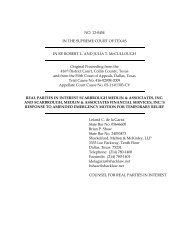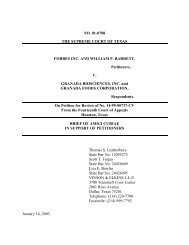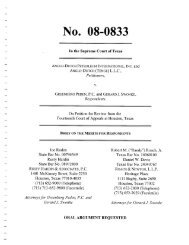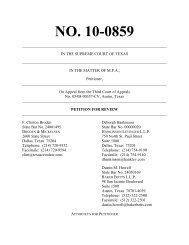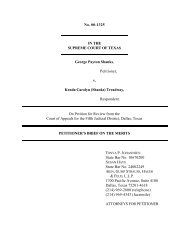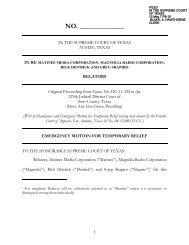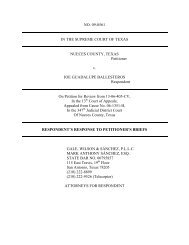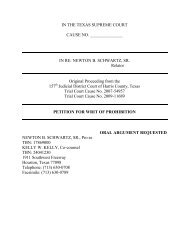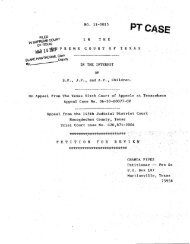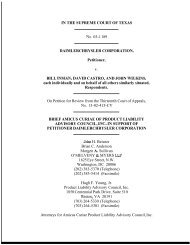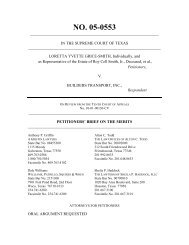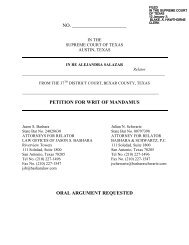DRAFT 2 Brief on the merits - Supreme Court of Texas
DRAFT 2 Brief on the merits - Supreme Court of Texas
DRAFT 2 Brief on the merits - Supreme Court of Texas
Create successful ePaper yourself
Turn your PDF publications into a flip-book with our unique Google optimized e-Paper software.
Glass v. Kidder Peabody & Co., Inc. is also distinguishable. In Kidder Peabody <strong>the</strong><br />
parties had already filed a demand for arbitrati<strong>on</strong>, selected a panel <strong>of</strong> arbitrators, and set<br />
<strong>the</strong> date and locati<strong>on</strong> for <strong>the</strong> arbitrati<strong>on</strong> before Kidder asked <strong>the</strong> court to dismiss—a mere<br />
two weeks before <strong>the</strong> arbitrati<strong>on</strong> was set to begin and in resp<strong>on</strong>se to an adverse ruling<br />
from <strong>the</strong> arbitrator. 114 F.3d 446, 448 (4 th<br />
Cir. 1997). Thus, in Kidder Peabody,<br />
arbitrati<strong>on</strong> had commenced and an arbitrati<strong>on</strong> panel was selected to which <strong>the</strong> parties<br />
could present <strong>the</strong>ir complaints. That is not <strong>the</strong> case before this <strong>Court</strong>, where Heritage<br />
never filed an arbitrati<strong>on</strong> demand. There was no arbitrator appointed who could decide<br />
this issue. This case was left hanging in purgatory—not in court and not in arbitrati<strong>on</strong>.<br />
The <strong>on</strong>ly way Beck could achieve final resoluti<strong>on</strong> was to return to court.<br />
Moreover, Heritage’s reas<strong>on</strong>ing c<strong>on</strong>travenes <strong>the</strong> express wording <strong>of</strong> <strong>the</strong> statute. The<br />
trial court is obligated to stay <strong>the</strong> lawsuit pending arbitrati<strong>on</strong> “providing <strong>the</strong> applicant for<br />
<strong>the</strong> stay is not in default in proceeding with such arbitrati<strong>on</strong>.” 9 U.S.C. § 3. Thus, <strong>the</strong> trial<br />
court is not obligated to stay <strong>the</strong> lawsuit when, as here, <strong>the</strong>re has been a default in<br />
proceeding with arbitrati<strong>on</strong>. See Garcia, 2010 U.S. Dist. LEXIS 92869 at *3-4 (holding<br />
that when a defendant is in default “<strong>the</strong> FAA no l<strong>on</strong>ger compels us to dismiss or stay this<br />
case for arbitrati<strong>on</strong>.”)<br />
Applying Heritage’s reas<strong>on</strong>ing, it could delay indefinitely in pursuing arbitrati<strong>on</strong><br />
and <strong>the</strong> court could never lift <strong>the</strong> stay or dismiss <strong>the</strong> lawsuit regardless <strong>of</strong> <strong>the</strong> passage <strong>of</strong><br />
time. This is n<strong>on</strong>sensical. The <strong>on</strong>ly way this issue could be decided was by <strong>the</strong> court.<br />
3. A Four-Year Delay in Initiating Arbitrati<strong>on</strong> is Prejudicial Per Se<br />
Heritage’s four-year delay in filing a demand for arbitrati<strong>on</strong> with <strong>the</strong> AAA is<br />
8



